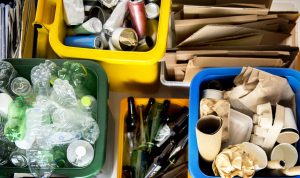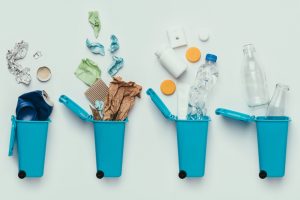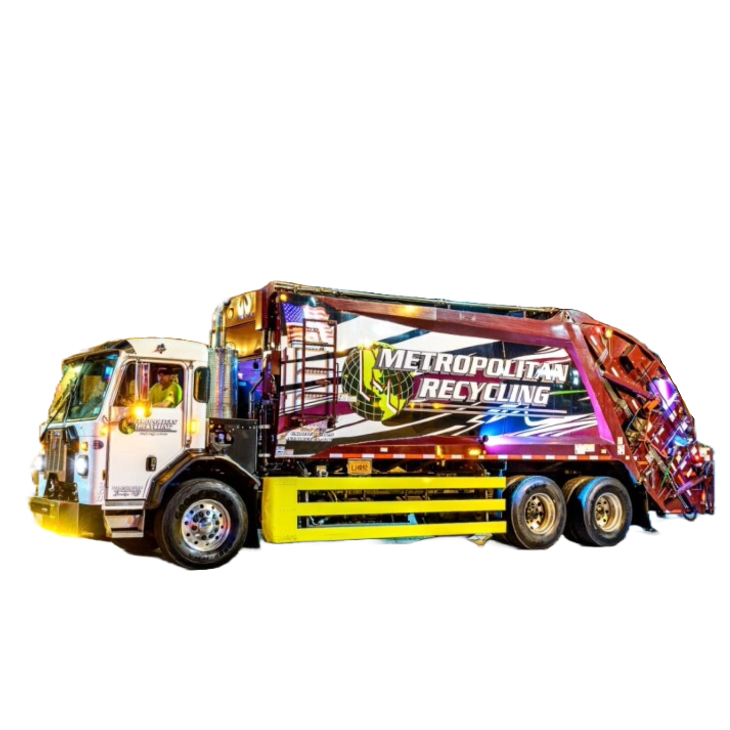The process of recycling, or simply the conversion of waste into new materials for industries and consumer products, is a concept that in 2022 is more important than ever. With the rise of environmental movements, zero-waste, and minimalist lifestyles, many individuals are turning their attention to why and how recycling affects our lives, the climate, and the well-being of the planet.
Trash and recycling are important issues that many environmentalists are urging us to pay serious attention to. Every single person produces waste through the consumption of products, and willingly or not, is contributing to a problem that we are yet to solve.
Why is recycling important? And what’s the truth about trash?
Let’s find out!
But first, here are 3 key waste facts that you need to keep in mind:
The average American throws away 4.9 lbs of trash per day. That’s over 1,780 lbs of trash per year.
The United States is the world’s largest generator of plastic waste.
According to the EPA (Environmental Protection Agency) about 75% of our waste is recyclable but only 30% of it is actually recycled.
These numbers are important to remember because all the waste we produce ends up somewhere – either in the dedicated landfills, at recycling centers, or what’s worse, untreated and out in the environment.
The Truth About Trash

At the beginning of 2022, there are probably not many people who haven’t heard of the importance of recycling. With the demand for more and more products that provide for not only our basic living needs but add to our comfort of living, there’s one question that inevitably comes into mind.
How do we currently manage our waste in the United States?
The United States is one of the largest producers of waste globally, but it is also one of the countries that has the best trash management regulations and practices put in place. These practices are not perfect, of course. Especially considering that the topic of trash, recycling, and waste management is still one that we struggle with globally.
But the US has developed facilities and established management procedures that nonetheless help us lift part of the burden created by our trash. Even most of the world’s largest waste management companies are based in the US. Yet, on average only about 30% of our waste is recycled. The rest goes to landfills or is exported overseas, where traceability of its management gets lost.
A few of the waste types that our industries and we, as end-users, produce are:
Municipal solid waste
Hazardous waste (including medical waste, radioactive waste, etc)
Industrial non-hazardous waste
Construction and demolition debris
Agricultural and animal waste
Extraction and mining waste
Oil and gas production waste
Fossil fuel combustion waste
Sewage sludge
The waste in the country is regulated by the EPA, under the 1976 Resource Conservation and Recovery Act (RCRA), which helps us gather better insights into the impact our waste has on the environment and how we can counteract these effects.
How Does Our Trash Affect the Environment & Our Health?

Every grocery product we purchase, every meal, and packaged good delivery box come wrapped in plastic, paper, or other material that contributes to the added issue of waste management.
The lack of proper trash management can lead to major consequences like:
Air pollution
Soil and water contamination
Harm to our ecosystem and our overall health
Just in 2018, the States produced 292 million tonnes of garbage that ended up in landfills. At the landfills, untreated food waste releases copious amounts of methane – one of the most powerful greenhouse gasses.
Actually, landfill waste produces approximately 11% of the world’s methane emissions. Methane is 84 times more potent at absorbing the sun’s heat and warming up the atmosphere, than carbon dioxide, and that makes it one of the biggest contributors to climate change and air pollution.
It’s mind-boggling to realize that the trash we produce that goes untreated poses a very real and significant threat to the purity of the air we breathe and the health consequences that will have on us.
But that’s not all. Trash also contributes to soil and water contamination, affecting the well-being of entire ecosystems and species. Waste seepages from landfills, sewage systems, and industrial sites, not only destroy fertile soil, but lay havoc on entire animal populations in the world’s rivers, seas, and oceans. Essentially turning our food resources into a hazard.
Recycling is important because it’s a solution to a very complex issue and holds the potential of mitigating these environmental and health risks. It is key to helping us restore the balance in our ecosystems.
How Does Recycling Help Us?

Consumers are increasingly interested in what happens to their trash and do their best to reduce their waste. Recycling is a topic that finds its way into everyday conversations and political debates that focus on our sustainable future. But what issues can recycling help us tackle?
-
It Reduces the Need for Producing New Plastic Material
For starters, recycling helps us keep plastics and other trash out of landfills and oceans. Plastics are currently the biggest polluter in our oceans, and their reduced manufacturing will help us deal with the harmful effects we have on ocean flora and fauna. Recycling the existing plastics into new tools will help us reduce the need of producing new plastics and decrease the use of new resources.
-
It Reduces Pollution from Fossil Fuels
Furthermore, recycling can help us produce electricity and heat, which in turn can reduce the use of fossil fuels like coal and oil – another significant category of polluters.
-
It Reduces Waste of Raw Materials
Single-use plastics in wrapping materials and cutlery take a lot of resources to produce. They require extraction or production of raw materials, transportation, distribution, and people’s labor, which on their own create more waste. All these efforts and use of nonrenewable resources chip away at the material reaches of the planet and often devastate ecosystems.
Recycling serves as a great alternative to the continuous manufacturing of products consumers find very little value in.
What further pushes the need for recycling our materials is the micro-plastic pollution that contaminates freshwater resources, crops, and soil. Traces of microplastics can even be found in fish, and later at our dinner tables.
What Issues Prevent Us from Properly Recycling Our Trash?

Garbage management is an issue that calls for our focused attention. Not much light is shed on the consequences of our consumer behavior and we don’t always know what happens to our trash.
A few of the issues that currently stand in the way of resolving our recycling issue are:
Consumer confusion and lack of recycling knowledge
Business responsibility or the lack of it
Not enough recycling or treatment facilities
Lost trash management traceability
Lack of governmental oversight
These issues, however, are not something that end consumers can’t solve on their own. They require the collective attention of governments, waste management companies, manufacturers, and consumers. Amidst all that, one thing is clear. Once put in place, recycling has the potential to help us reduce the harmful impact on the ecosystems and our well-being.
On a Closing Note

Recycling is a topic that needs to be at the forefront of our efforts of living a more sustainable, modern life that is driven by practices that stand the test of time and leave the world clean for the following generations.
And while we are taking steps toward reducing waste and managing our trash more effectively, the truth is there is much more that needs to be done to counterbalance our habits as consumers.
It all begins with our personal responsibility of trying to reduce and reuse but recycling requires action on every level of our society and business. Recycling helps us preserve the environment and it also safeguards our health. We must know more about it and look for solutions to improve what our current recycling system lacks.

